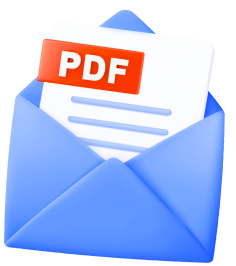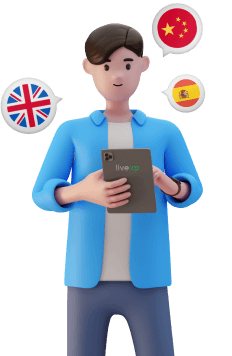
Proven Tips on How to Memorize Vocabulary Faster
If you are wondering how to remember English words, the following tips will help you learn vocabulary faster while also retaining what you’ve learned.

Get a FREE guide!
Want to sound like a native English speaker?
Get our free PDF with top tips that work.

Check your email!
Most students who begin learning a new language struggle with learning new vocabulary. As someone who has had trouble learning and memorizing new vocabulary in several languages, I know the struggle.
As a result, I’ve compiled a list of tips that have and continue to help me when learning new words. With these strategies, from creating fun memory tricks to using spaced repetition methods, you’ll be well on your way to expanding your vocabulary and language skills in no time.
But before we get into these tips, let’s look at what works best for you based on the type of memory you prefer.
Determine your type of memory to memorize words quickly
When wondering how to memorize words quickly, understanding the various types of memory can significantly impact your learning process. Memory is classified into three types: visual, auditory, and kinesthetic.
- Visual Memory refers to recalling visual information, such as images, pictures, videos, and texts. That is, you will memorize vocabulary faster if you read, write, or associate it with real-world objects.
- Auditory memory refers to recalling sounds, words, and oral information. That means you’ll learn words quickly through listening exercises, lessons, podcasts, and even conversations with native speakers.
- Kinesthetic memory refers to the ability to learn through physical movements or muscle memory, such as playing the guitar or driving. While this may appear to be irrelevant to vocabulary memorization, it can help when you associate words with specific movements or actions.
Each of us may perform better with one or more types of memory. For example, I am primarily visual and slightly kinesthetic, but my auditory memory is severely lacking. I can remember the majority of what I read or watch, and I can quickly learn kinetic patterns, but if I watch a 2-hour lecture, I will forget everything I picked up in a matter of hours. That’s why I prefer to learn vocabulary through apps and writing practice over podcasts. At the end of the day, you decide which advice works best for you and your preferred memory type.
Active and passive memory
Aside from the types of memory mentioned above, when learning a new language and its vocabulary, we can distinguish between two more types of memory: active and passive.
Active memory, on the other hand, allows you to use words in conversation without much thought effortlessly.
But how do we “move” a word into our active memory? Let’s find out below!
Tips on how to learn English vocabulary fast
Each of us has struggled to memorize words when learning a new language. Sometimes, the word is on the tip of your tongue, but you can’t remember it. Fortunately, there are numerous tips and techniques for memorizing and remembering words without confusing them with other words from the same or even different languages.
If you are wondering how to remember English words, the following tips will help you learn vocabulary faster while also retaining what you’ve learned. Let’s look at eleven practical tips to help you find the ones that work best for you.
Spaced repetition method—the best way to memorize words
Spaced repetition has been shown to be an extremely effective method for encoding new vocabulary in long-term memory. It works by arranging frequent review sessions at short intervals. This method employs the spacing effect, which suggests that information is better retained when revisited at spaced intervals rather than in a single intensive session.
You can also benefit from LiveXP’s Word Trainer, which employs a spaced repetition algorithm for learning activities. To help you learn new words, the app reminds you to review them in 1 day, 3 days, 7 days, and 14 days. LiveXP’s algorithm prevents over-practicing, as spaced repetition works the most effectively when done right.
Focus on high-frequency words first
If you are still in the early stages of learning a language, you should prioritize learning high-frequency words. When you learn, memorize, and master the most essential lexical items first, then you pave the road for expediting your language acquisition process.
Make lists of words commonly used in everyday communication and memorize them. These will help you build a strong foundation in the language you are learning, allowing you to become more rapidly fluent by establishing a vocabulary base applicable in many contexts. Fluency in this practical vocabulary will allow you to relax as you build on your communication skills while leaving you space to create more “difficult” words.
In LiveXP’s Word Trainer, there are already prepared basic English word sets available to learn. This way, you can start memorizing words for everyday communication and adding vocabulary you meet in writing or listening.
Create visual aids and flashcards
Visual aids are ideal for people with strong visual memories. They allow you to create material using color, notes, and visual cues to help you learn and retain linguistic information.
Some of the most common visual aids are:
- Mind maps;
- Flashcards;
- Color-coded notes;
- Highlighting words in different colors;
- Drawings of the object a word represents;
- Personal notes and patterns that can help you remember a word based on your knowledge of the world.
The use of color can activate your brain’s visual processing center, whereas word associations aid in recognizing patterns and connections between words, resulting in a better understanding of their meaning.
Listen to podcasts and audiobooks
On the other hand, if you have a strong auditory memory, active listening is an excellent way to learn and retain new vocabulary. Immersion in authentic language contexts exposes you to extremely useful situations such as natural speech patterns and intonation, idioms, varied vocabulary usage, and slang.
Being exposed to native speakers’ speech allows you to become acquainted with various accents and conversational styles, as well as identify which words are most commonly used and why. This allows you to not only memorize vocabulary faster but also learn it in context, thus making it easier to employ the words in your active memory.
Active learning
The best way to learn new words is through active learning. Active learning means not just learning words by heart but practicing them in writing and speaking. Agree that it’s not quite beneficial to know a lot of words but not be able to use them in real-life conversations. The LiveXP platform provides you with active learning resources. While the Vocabulary feature and Word Trainer both work to boost your vocabulary, LiveXP English tutors are available for online private lessons to help you practice new words in real life and understand how to use them. This way, you practice speaking with a tutor, discussing different topics, and expanding your vocabulary.
Practice writing
Another great way to internalize any new vocabulary you learn is to use it in context - and what better way to do so than to write? And by writing, we don’t just mean writing down a word you learn (though that can be beneficial as well), but full-fledged writing, stories and sentences, journals, and conversations with friends.
When you start writing down the new vocabulary you’ve learned, you not only reinforce your memory of the words, but you also gain a better understanding of how they’re used in everyday situations. Using vocabulary in meaningful contexts can greatly improve your language skills and help you express thoughts and ideas more clearly and effectively. Furthermore, writing exercises allow you to experiment with different sentence structures and nuances of meaning, resulting in a more complete understanding of the language, thus helping both your active and passive memory. But it’s essential here to learn from your mistakes. When you practice writing on your own, you could miss typos, use wrong words, etc. But when you discuss your writing with an English tutor during your lessons on LiveXP, a teacher can highlight your mistakes or inaccuracies and suggest improvements. Learning from your mistakes is a crucial part of studying any language.
Utilize apps and technology to learn vocabulary fast
There are few things today that cannot be improved through the use of technology. Incorporating technology and apps into your vocabulary learning routine can help you study more efficiently and effectively.
There are numerous apps available, ranging from Duolingo and Clozemaster to Babbel and LiveXP, that provide interactive and engaging ways to help you learn and practice new words virtually. These apps use techniques such as quizzes, games, spaced repetition systems, audiovisual content, and so on. These tools provide you with a dynamic learning experience that is tailored to your specific progress and learning style. The best part is that most of these apps provide constant and easy access to the new vocabulary you’ve already learned, making it easier to look up a word you can’t remember.
Speaking classes with native speakers
Speaking classes with native English speakers on LiveXP is a practical and rewarding way to put your newly learned vocabulary into practice. You can practice the words you’ve learned and get immediate feedback from native speakers on your language use, all while improving your fluency. This makes it easier to learn and remember the word you used, even if you didn’t use it correctly the first time.
Aside from vocabulary memorization, language exchange partnerships can also promote cultural understanding and communication skills. That way, if you ever visit a country that speaks your target language, you’ll know which word or phrase is appropriate for each situation. Most of the time, it will be different from a typical expression you have learned from a textbook since language evolves and changes at such a rapid pace!
Practice newly learned vocabulary in speaking classes with native English speakers on LiveXP. Learn to speak real-life language online.
Set specific goals
If you want to find out how to learn English vocabulary fast, you should focus on setting clear and specific goals. Knowing where you want to go is the first and most important step toward determining how to get there. Setting clear and concise goals will help you track your progress, whether you want to learn a few words per week or a specific number within a timeframe.
These smaller goals also help you celebrate your achievements. Breaking down hundreds of words into smaller chunks will make you feel better because you will remember them more easily.
Personalize your experience
Choosing words that interest you is a great way to get started with vocabulary learning. Find or make lists of words in your target language that are relevant to your personal interests, hobbies, or activities in everyday life. This will not only boost your motivation but also increase your engagement because you will be learning words about topics that you are passionate about or with whom you interact on a daily basis.
Personalizing your vocabulary learning experience will not only make learning new words more enjoyable but also help you remember and apply the vocabulary in real-life situations, making language learning a more personal and enriching endeavor.
Create a rewards system
While some may find this “childish,” I believe the rewards system is an excellent way to maintain motivation and foster a sense of accomplishment. That is why I use it in all of my learning endeavors, including language learning.
You can begin by establishing specific goals or small milestones and rewarding yourself for achieving them. For example, you can set smaller and larger rewards of your choice; when you complete smaller milestones, you can reward yourself with small things, while when you complete a larger goal, you can choose a larger reward.
This approach will boost your morale and self-esteem by giving you a sense of accomplishment for completing milestones and remembering words, as well as motivating you to keep going!
The most important thing—be consistent
At the end of the day, consistency is essential for successful vocabulary acquisition. Regardless of the techniques or tools you use, the most important aspect of memorizing vocabulary faster is sticking to a consistent and disciplined practice routine. Regular exposure to new words, frequent review sessions, and daily language activities are all recommended.
If you struggle to keep a schedule, you should consider working with a tutor. A one-on-one lesson with LiveXP’s experienced tutors can help you improve your vocabulary by practicing memorized words in real-life conversations, putting them into your “active memory.”
Tips on how to memorize vocabulary faster: a conclusion
To summarize, mastering the art of memorizing new vocabulary faster is more than just using one technique or adhering to a strict set of rules. It combines effective strategies, personalized approaches, and consistent practice to improve your language learning journey.
By incorporating the various factors and techniques mentioned above into your daily language routines and also by remaining committed to your goals and objectives, you can open the door to a more expansive vocabulary and a deeper understanding of the language world around you. Good luck in your learning endeavors!
















